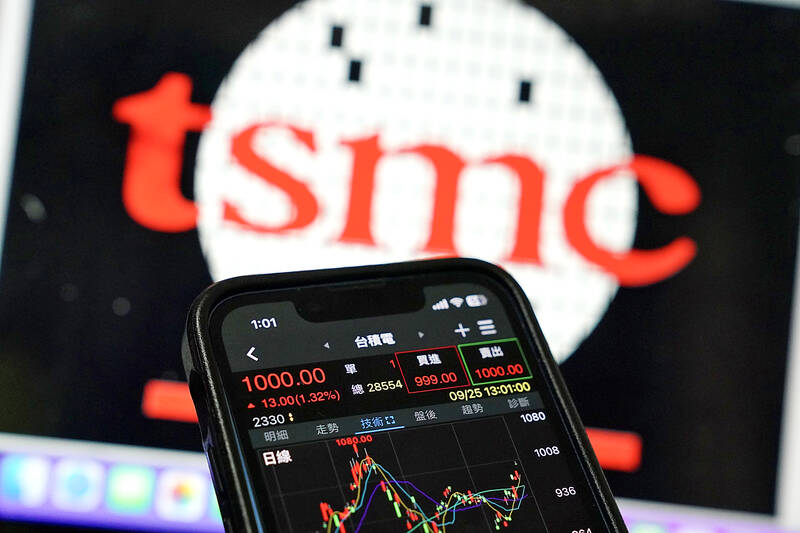Taiwan Semiconductor Manufacturing Co (TSMC, 台積電) yesterday posted a better-than-expected 39 percent rise in quarterly revenue, assuaging concerns that artificial intelligence (AI) hardware spending is beginning to taper off.
The main chipmaker for Nvidia Corp and Apple Inc reported third-quarter sales of NT$759.69 billion (US$23.6 billion), compared with the average analyst projection of NT$748 billion.
For last month alone, TSMC reported revenue jumped 39.6 percent year-on-year to NT$251.87 billion. Taiwan’s largest company is to disclose its full third-quarter earnings on Thursday next week and update its outlook.

Photo: CNA
Hsinchu-based TSMC produces the cutting-edge chips needed to train AI. The company now makes more than half of its revenue from high-performance computing, the segment of its business driven by AI demand.
However, views have begun to diverge in recent months on whether the AI-driven growth momentum would last.
Some investors have cautioned that the likes of Meta Platforms Inc and Alphabet Inc’s Google cannot sustain their current pace of infrastructure spending without a compelling and monetizable AI use case. That skepticism has led to a pullback in AI stocks, including flag bearer Nvidia, in recent months.
Still, TSMC shares have more than doubled since the launch of ChatGPT in late 2022, with its market capitalization briefly crossing the US$1 trillion mark in July. That month, the company also lifted its outlook for this year’s revenue growth after quarterly results beat estimates.
The revision underscored TSMC’s view that AI spending would remain elevated despite growing US-Chinese trade tensions. In both countries, start-ups and tech firms from Microsoft Corp to Baidu Inc (百度) are splurging on AI infrastructure in a race to develop applications.
Some analysts worry that delays in the delivery of Nvidia’s latest Blackwell chips might disrupt the industry, although most investors do not view that as a long-term issue for TSMC. With Intel Corp and Samsung Electronics Co struggling to get ahead in the business of bespoke chipmaking, TSMC’s market leadership is expected to help prop up margins.
Nvidia’s key server assembly partner Hon Hai Precision Industry Co (鴻海精密) this week also reaffirmed that demand for its AI hardware remains solid.
Hon Hai chairman Young Liu (劉揚偉) on Tuesday said that his company plans to boost server production capacity to meet “crazy” demand for next-generation Blackwell chips, echoing similar remarks from Nvidia chief executive officer Jensen Huang (黃仁勳) earlier this month.

To many, Tatu City on the outskirts of Nairobi looks like a success. The first city entirely built by a private company to be operational in east Africa, with about 25,000 people living and working there, it accounts for about two-thirds of all foreign investment in Kenya. Its low-tax status has attracted more than 100 businesses including Heineken, coffee brand Dormans, and the biggest call-center and cold-chain transport firms in the region. However, to some local politicians, Tatu City has looked more like a target for extortion. A parade of governors have demanded land worth millions of dollars in exchange

An Indonesian animated movie is smashing regional box office records and could be set for wider success as it prepares to open beyond the Southeast Asian archipelago’s silver screens. Jumbo — a film based on the adventures of main character, Don, a large orphaned Indonesian boy facing bullying at school — last month became the highest-grossing Southeast Asian animated film, raking in more than US$8 million. Released at the end of March to coincide with the Eid holidays after the Islamic fasting month of Ramadan, the movie has hit 8 million ticket sales, the third-highest in Indonesian cinema history, Film

Taiwan Semiconductor Manufacturing Co’s (TSMC, 台積電) revenue jumped 48 percent last month, underscoring how electronics firms scrambled to acquire essential components before global tariffs took effect. The main chipmaker for Apple Inc and Nvidia Corp reported monthly sales of NT$349.6 billion (US$11.6 billion). That compares with the average analysts’ estimate for a 38 percent rise in second-quarter revenue. US President Donald Trump’s trade war is prompting economists to retool GDP forecasts worldwide, casting doubt over the outlook for everything from iPhone demand to computing and datacenter construction. However, TSMC — a barometer for global tech spending given its central role in the

Alchip Technologies Ltd (世芯), an application-specific integrated circuit (ASIC) designer specializing in server chips, expects revenue to decline this year due to sagging demand for 5-nanometer artificial intelligence (AI) chips from a North America-based major customer, a company executive said yesterday. That would be the first contraction in revenue for Alchip as it has been enjoying strong revenue growth over the past few years, benefiting from cloud-service providers’ moves to reduce dependence on Nvidia Corp’s expensive AI chips by building their own AI accelerator by outsourcing chip design. The 5-nanometer chip was supposed to be a new growth engine as the lifecycle